2022-2023学年初高英语衔接语法第一课——时态 课件-(17张ppt)
文档属性
| 名称 | 2022-2023学年初高英语衔接语法第一课——时态 课件-(17张ppt) | 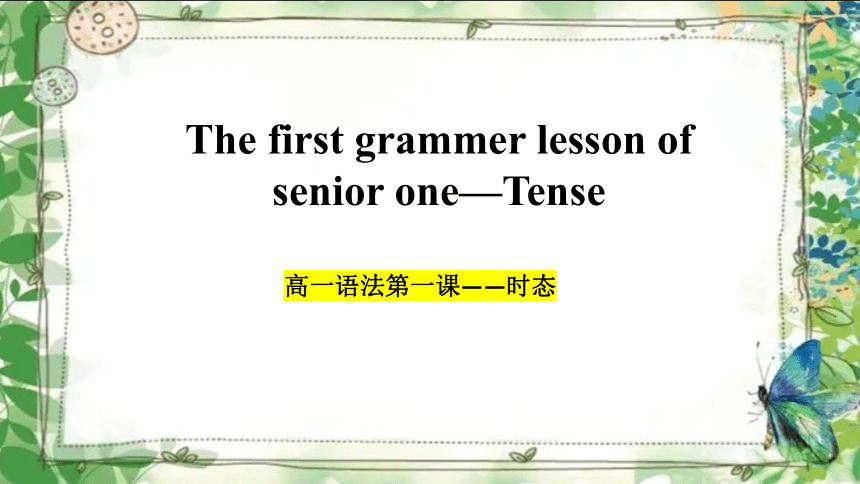 | |
| 格式 | zip | ||
| 文件大小 | 1.7MB | ||
| 资源类型 | 教案 | ||
| 版本资源 | 人教版(2019) | ||
| 科目 | 英语 | ||
| 更新时间 | 2022-08-18 18:22:11 | ||
图片预览

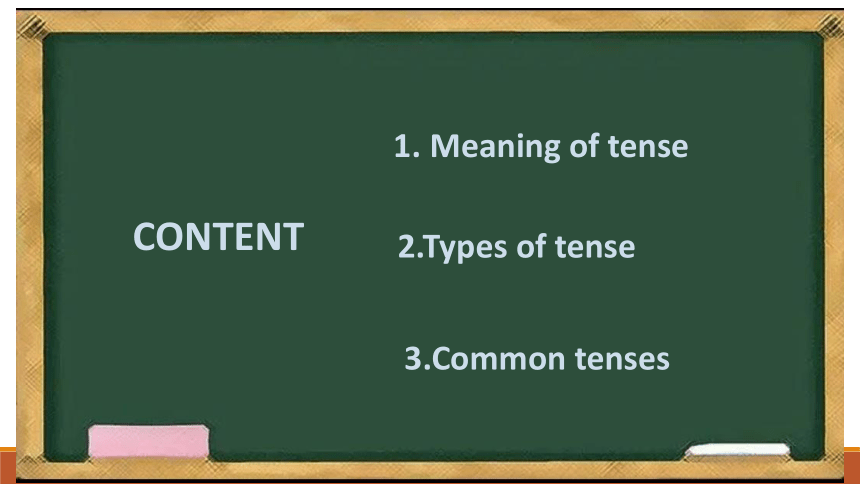
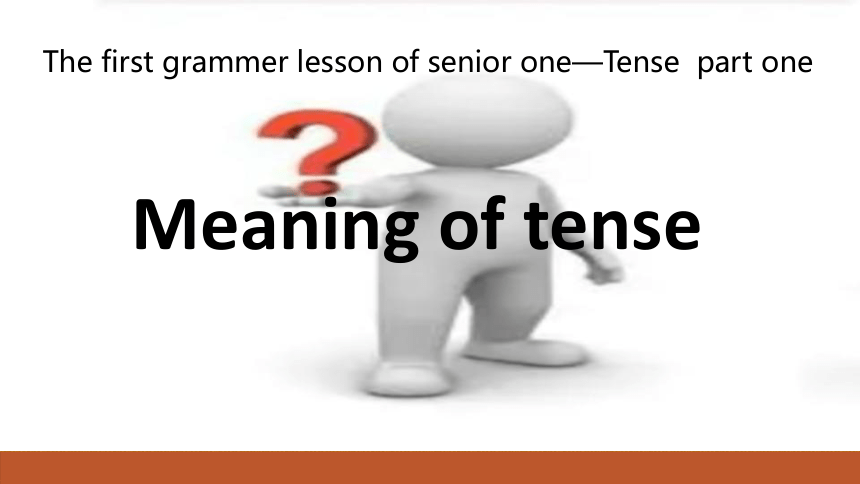
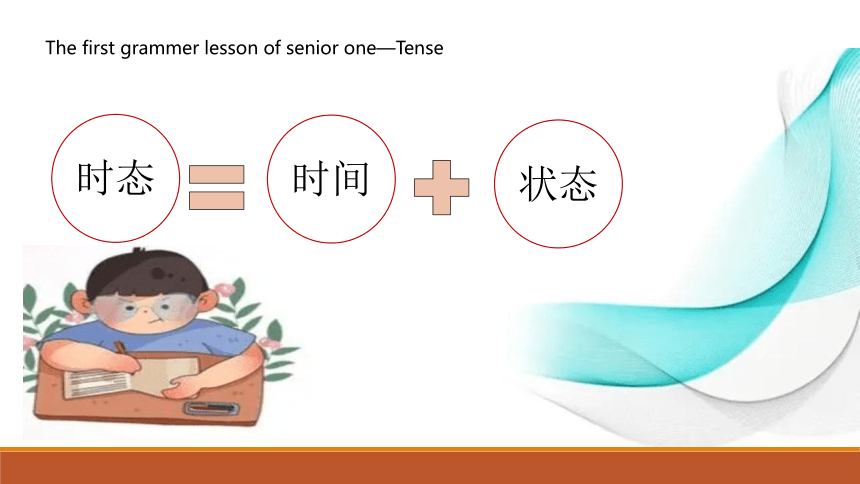
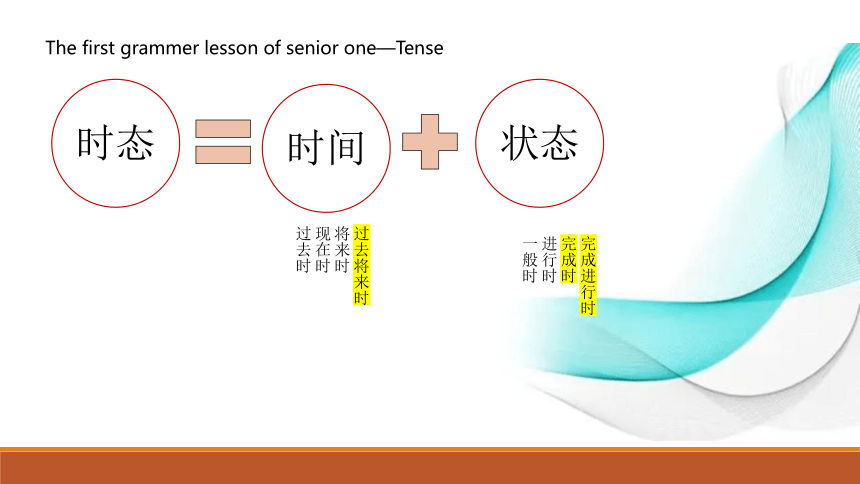
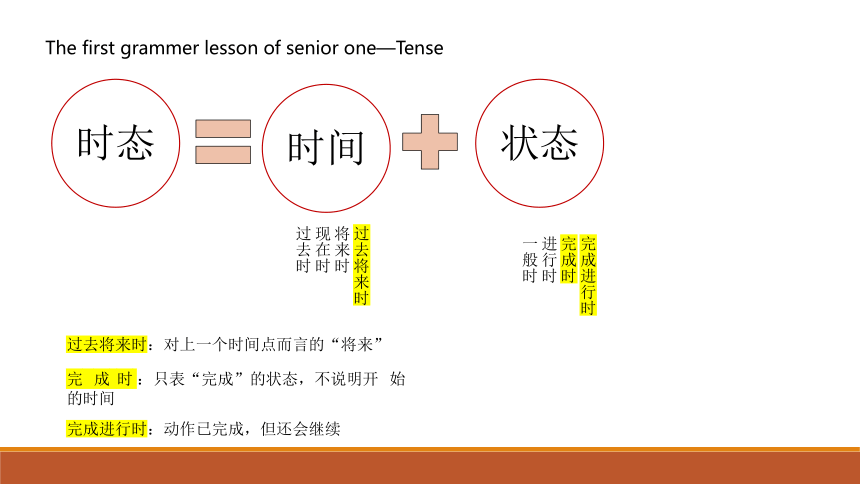
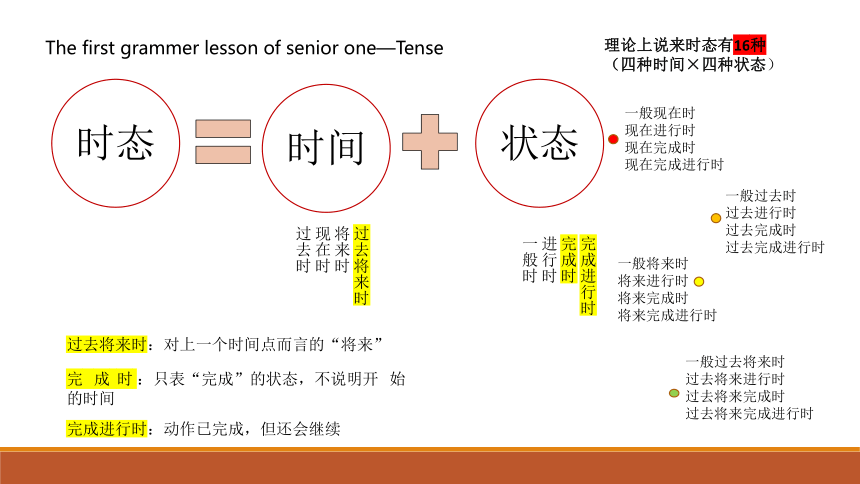
文档简介
(共17张PPT)
The first grammer lesson of senior one—Tense
高一语法第一课——时态
CONTENT
Meaning of tense
2.Types of tense
3.Common tenses
Meaning of tense
The first grammer lesson of senior one—Tense part one
The first grammer lesson of senior one—Tense
The first grammer lesson of senior one—Tense
过去将来时
将来时
现在时
过去时
完成进行时
完成时
进行时
一般时
The first grammer lesson of senior one—Tense
过去将来时
将来时
现在时
过去时
完成进行时
完成时
进行时
一般时
过去将来时:对上一个时间点而言的“将来”
完 成 时 :只表“完成”的状态,不说明开 始的时间
完成进行时:动作已完成,但还会继续
The first grammer lesson of senior one—Tense
过去将来时
将来时
现在时
过去时
完成进行时
完成时
进行时
一般时
过去将来时:对上一个时间点而言的“将来”
完 成 时 :只表“完成”的状态,不说明开 始的时间
完成进行时:动作已完成,但还会继续
理论上说来时态有16种
(四种时间×四种状态)
一般现在时
现在进行时
现在完成时
现在完成进行时
一般过去时
过去进行时
过去完成时
过去完成进行时
一般将来时
将来进行时
将来完成时
将来完成进行时
一般过去将来时
过去将来进行时
过去将来完成时
过去将来完成进行时
The first grammer lesson of senior one—Tense part two
Types of tense
The first grammer lesson of senior one—Tense part two
“现在”时
一般现在时:
I eat bananas./He eats an apple.
现在进行时:
动词原形/第三人称单数形式
助动词be的变式+现在分词
I am eating bananas./
He is eating an apple.
现在完成时:
have的变式+过去分词
I have eaten bananas./
He has eaten an apple.
现在完成进行时:
Have的变式+been+现在分词
I have been eating bananas./
He has been eating an apple.
我/他已经吃完香蕉了,但还会继续吃
“过去”时
The first grammer lesson of senior one—Tense part two
一般过去时:
动词过去式
过去进行时:
助动词be的变式+现在分词
过去完成时:
had+过去分词
过去完成进行时:
had+been+现在分词
I aet a banana./
He watched TV yesterday.
I was playing computer last night.
She had finished writing the composition before it began to rain.
The had only been waiting for the bus a few minutes when it came.
had----原构成为“have的变式”,由于这里是过去时,故直接写为“had”
The first grammer lesson of senior one—Tense part two
“将来”时
一般将来时:
将来进行时:
将来完成时:
将来完成进行时:
will+动词原形
will+be+现在分词
will+have+过去分词
will+have+been+现在分词
I will go to Beijing tomorrow.
I will be eating a banana for
breakfast.
I will have done my homework
by next week.
I will have been working for his
Company for 5years by this time
next week.
The first grammer lesson of senior one—Tense part two
“将来”时
一般将来时除will+动词原形外,常见的表达还有,
Be going to+动词原形
Be to +动词原形
Be about to+动词原形
虽然都表“将来”之意,但也有不同之处。
We be going to the cinema tonight.
The first grammer lesson of senior one—Tense part two
“将来”时
1.Be going to表示的“将要”比will时间更短。且前者有“计划”之意。
I am going to do my homework.与I will do my homework.
两者都是要做作业,但前者有“马上,立刻”的意思,后者时间则不确定。
2.Be going to表示的“将来”基于主观判断,will基于客观判断。
He will be 70 years old.
3.Be to +动词原形表示征求意见,按计划将要发生的事。
I am to stay at home tomorrow.
Are we to go to Beijing tomorrow
4.Be about to为即将发生的动作,其后通常
不接时间状语
We are about to arrive.
我们明天去北京吗?
他即将70岁。
今晚我们会去电影院。
(按计划)我明天会呆在家
我们马上就到了
The first grammer lesson of senior one—Tense part two
“过去将来”时
一般过去将来时:
过去将来进行时:
过去将来完成时:
过去将来完成进行时:
Would+动词原形
Would+be+现在分词
Would+have+过去分词
Would+have+been+现在分词
I didn`t know if he would come.
She said he would be coming.
She said he have arrived this moring.
I would have been working.
注:
在“将来时”的基础上增加“would”
The first grammer lesson of senior one—Tense part three
Common tenses
The first grammer lesson of senior one—Tense part three
一般 进行 完成 完成进行
现在 一般现在时 现在进行时 现在完成时 现在完成进行时
过去 一般过去时 过去进行时 过去完成时 过去完成进行时
将来 一般将来时 将来进行时 将来完成时 将来完成进行时
过去将来 一般过去将来时 过去将来进行时 过去将来完成时 过去将来完成进行时
不常用
THANKS FOR WATCHING
The first grammer lesson of senior one—Tense
高一语法第一课——时态
CONTENT
Meaning of tense
2.Types of tense
3.Common tenses
Meaning of tense
The first grammer lesson of senior one—Tense part one
The first grammer lesson of senior one—Tense
The first grammer lesson of senior one—Tense
过去将来时
将来时
现在时
过去时
完成进行时
完成时
进行时
一般时
The first grammer lesson of senior one—Tense
过去将来时
将来时
现在时
过去时
完成进行时
完成时
进行时
一般时
过去将来时:对上一个时间点而言的“将来”
完 成 时 :只表“完成”的状态,不说明开 始的时间
完成进行时:动作已完成,但还会继续
The first grammer lesson of senior one—Tense
过去将来时
将来时
现在时
过去时
完成进行时
完成时
进行时
一般时
过去将来时:对上一个时间点而言的“将来”
完 成 时 :只表“完成”的状态,不说明开 始的时间
完成进行时:动作已完成,但还会继续
理论上说来时态有16种
(四种时间×四种状态)
一般现在时
现在进行时
现在完成时
现在完成进行时
一般过去时
过去进行时
过去完成时
过去完成进行时
一般将来时
将来进行时
将来完成时
将来完成进行时
一般过去将来时
过去将来进行时
过去将来完成时
过去将来完成进行时
The first grammer lesson of senior one—Tense part two
Types of tense
The first grammer lesson of senior one—Tense part two
“现在”时
一般现在时:
I eat bananas./He eats an apple.
现在进行时:
动词原形/第三人称单数形式
助动词be的变式+现在分词
I am eating bananas./
He is eating an apple.
现在完成时:
have的变式+过去分词
I have eaten bananas./
He has eaten an apple.
现在完成进行时:
Have的变式+been+现在分词
I have been eating bananas./
He has been eating an apple.
我/他已经吃完香蕉了,但还会继续吃
“过去”时
The first grammer lesson of senior one—Tense part two
一般过去时:
动词过去式
过去进行时:
助动词be的变式+现在分词
过去完成时:
had+过去分词
过去完成进行时:
had+been+现在分词
I aet a banana./
He watched TV yesterday.
I was playing computer last night.
She had finished writing the composition before it began to rain.
The had only been waiting for the bus a few minutes when it came.
had----原构成为“have的变式”,由于这里是过去时,故直接写为“had”
The first grammer lesson of senior one—Tense part two
“将来”时
一般将来时:
将来进行时:
将来完成时:
将来完成进行时:
will+动词原形
will+be+现在分词
will+have+过去分词
will+have+been+现在分词
I will go to Beijing tomorrow.
I will be eating a banana for
breakfast.
I will have done my homework
by next week.
I will have been working for his
Company for 5years by this time
next week.
The first grammer lesson of senior one—Tense part two
“将来”时
一般将来时除will+动词原形外,常见的表达还有,
Be going to+动词原形
Be to +动词原形
Be about to+动词原形
虽然都表“将来”之意,但也有不同之处。
We be going to the cinema tonight.
The first grammer lesson of senior one—Tense part two
“将来”时
1.Be going to表示的“将要”比will时间更短。且前者有“计划”之意。
I am going to do my homework.与I will do my homework.
两者都是要做作业,但前者有“马上,立刻”的意思,后者时间则不确定。
2.Be going to表示的“将来”基于主观判断,will基于客观判断。
He will be 70 years old.
3.Be to +动词原形表示征求意见,按计划将要发生的事。
I am to stay at home tomorrow.
Are we to go to Beijing tomorrow
4.Be about to为即将发生的动作,其后通常
不接时间状语
We are about to arrive.
我们明天去北京吗?
他即将70岁。
今晚我们会去电影院。
(按计划)我明天会呆在家
我们马上就到了
The first grammer lesson of senior one—Tense part two
“过去将来”时
一般过去将来时:
过去将来进行时:
过去将来完成时:
过去将来完成进行时:
Would+动词原形
Would+be+现在分词
Would+have+过去分词
Would+have+been+现在分词
I didn`t know if he would come.
She said he would be coming.
She said he have arrived this moring.
I would have been working.
注:
在“将来时”的基础上增加“would”
The first grammer lesson of senior one—Tense part three
Common tenses
The first grammer lesson of senior one—Tense part three
一般 进行 完成 完成进行
现在 一般现在时 现在进行时 现在完成时 现在完成进行时
过去 一般过去时 过去进行时 过去完成时 过去完成进行时
将来 一般将来时 将来进行时 将来完成时 将来完成进行时
过去将来 一般过去将来时 过去将来进行时 过去将来完成时 过去将来完成进行时
不常用
THANKS FOR WATCHING
